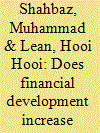| Srl | Item |
| 1 |
ID:
150398


|
|
|
|
|
| Summary/Abstract |
This paper examines the integration properties of the total oil consumption in 57 countries for the period of 1965–2012. A combination of new and powerful linear and nonlinear stationarity tests are employed to achieve the objectives of the study. We find that the oil consumption series in 21 countries follow a nonlinearity path while those in the other countries are linear in nature. Evidence of the presence of a unit root is found for the total oil consumption series in 38 countries while the series is stationary in the remaining 19 countries. An important insight is that the blueprints that were designed to reduce oil consumption are likely to have a permanent effect in most of the countries.
|
|
|
|
|
|
|
|
|
|
|
|
|
|
|
|
| 2 |
ID:
111100


|
|
|
|
|
| Publication |
2012.
|
| Summary/Abstract |
This paper assesses the relationship among energy consumption, financial development, economic growth, industrialization and urbanization in Tunisia from 1971 to 2008. The autoregressive distributed lag bounds testing approach to cointegration and Granger causality tests is employed for the analysis. The result confirms the existence of long-run relationship among energy consumption, economic growth, financial development, industrialization and urbanization in Tunisia. Long-run bidirectional causalities are found between financial development and energy consumption, financial development and industrialization, and industrialization and energy consumption. Hence, sound and developed financial system that can attract investors, boost the stock market and improve the efficiency of economic activities should be encouraged in the country. Nevertheless, promoting industrialization and urbanization can never be left out from the process of development. We add light to policy makers with the role of financial development, industrialization and urbanization in the process of economic development.
|
|
|
|
|
|
|
|
|
|
|
|
|
|
|
|
| 3 |
ID:
088994


|
|
|
|
|
| Publication |
2009.
|
| Summary/Abstract |
Previous studies that have tested for a unit root in aggregate energy consumption have potentially reached misleading conclusions because they fail to allow for the possibility that energy consumption might be fractionally integrated and do not distinguish between different types of energy consumption. This study tests for long memory in disaggregated petroleum consumption in the United States using univariate and multivariate Lagrange multiplier (LM) tests for fractional integration. The results point strongly to the need to distinguish between different forms of energy consumption and allow for a generalization of the I(0)/I(1) dichotomy when considering the order of integration of energy consumption. Allowing for short-run dynamics, the univariate test suggests that less than 50% of the series are fractionally integrated. Consistent with expectations the non-stationary series are found to have the highest mean and standard deviation. The multivariate test suggests that petroleum consumption in the commercial and industrial sectors is clearly fractionally integrated when allowing for short-run dynamics, and, as such, exhibits persistent effects, while petroleum consumption in the residential sector is a stationary process.
|
|
|
|
|
|
|
|
|
|
|
|
|
|
|
|
| 4 |
ID:
080437


|
|
|
|
|
| Publication |
2007.
|
| Summary/Abstract |
This paper employs the modified Wald (MWALD) causality test to re-examine the relationship between crime and its determinants (inflation and unemployment) in the United States from 1960 to 2005. Bounds test approach is employed to investigate the existence of a long-run relationship. The empirical evidence suggests that inflation and crime rates are cointegrated with a positive relationship. Moreover, the causal link is from inflation and unemployment to crime
|
|
|
|
|
|
|
|
|
|
|
|
|
|
|
|
| 5 |
ID:
133042


|
|
|
|
|
| Publication |
2014.
|
| Summary/Abstract |
This paper examines whether initiatives to promote hydroelectricity consumption are likely to be effective by applying univariate and panel Lagrange Multiplier (LM) unit root tests to hydroelectricity consumption in 55 countries over the period 1965-2011. We find that for the panel, as well as about four-fifths of individual countries, that hydroelectricity consumption is stationary. This result implies that shocks to hydroelectricity consumption in most countries will only result in temporary deviations from the long-run growth path. An important consequence of this finding is that initiatives designed to have permanent positive effects on hydroelectricity consumption, such as large-scale dam construction, are unlikely to be effective in increasing the share of hydroelectricity, relative to consumption of fossil fuels.
|
|
|
|
|
|
|
|
|
|
|
|
|
|
|
|